Employee Turnover Challenges and Solutions: The Imperial Hotel Report
VerifiedAdded on 2023/01/12
|8
|2475
|65
Report
AI Summary
This report examines the issue of high staff turnover at The Imperial Hotel in London, a 4-star hotel facing challenges due to employee dissatisfaction, poor work culture, and issues between front and back-of-house staff. The analysis explores the root causes of the problem and proposes corrective actions. The report suggests using motivational, training, and management theories to reduce employee turnover and improve overall operational efficiency. It highlights the importance of culture, referencing Hofstede's cultural dimensions theory, to improve employee relations. Additionally, the report discusses the application of Maslow's hierarchy of needs for employee motivation and emphasizes the need for proper training, flexible organizational structure, and effective management of working hours and pay plans. The conclusion emphasizes that The Imperial Hotel can reduce employee turnover by implementing these strategies, leading to improved customer satisfaction, reduced staff conflicts, and enhanced overall performance.
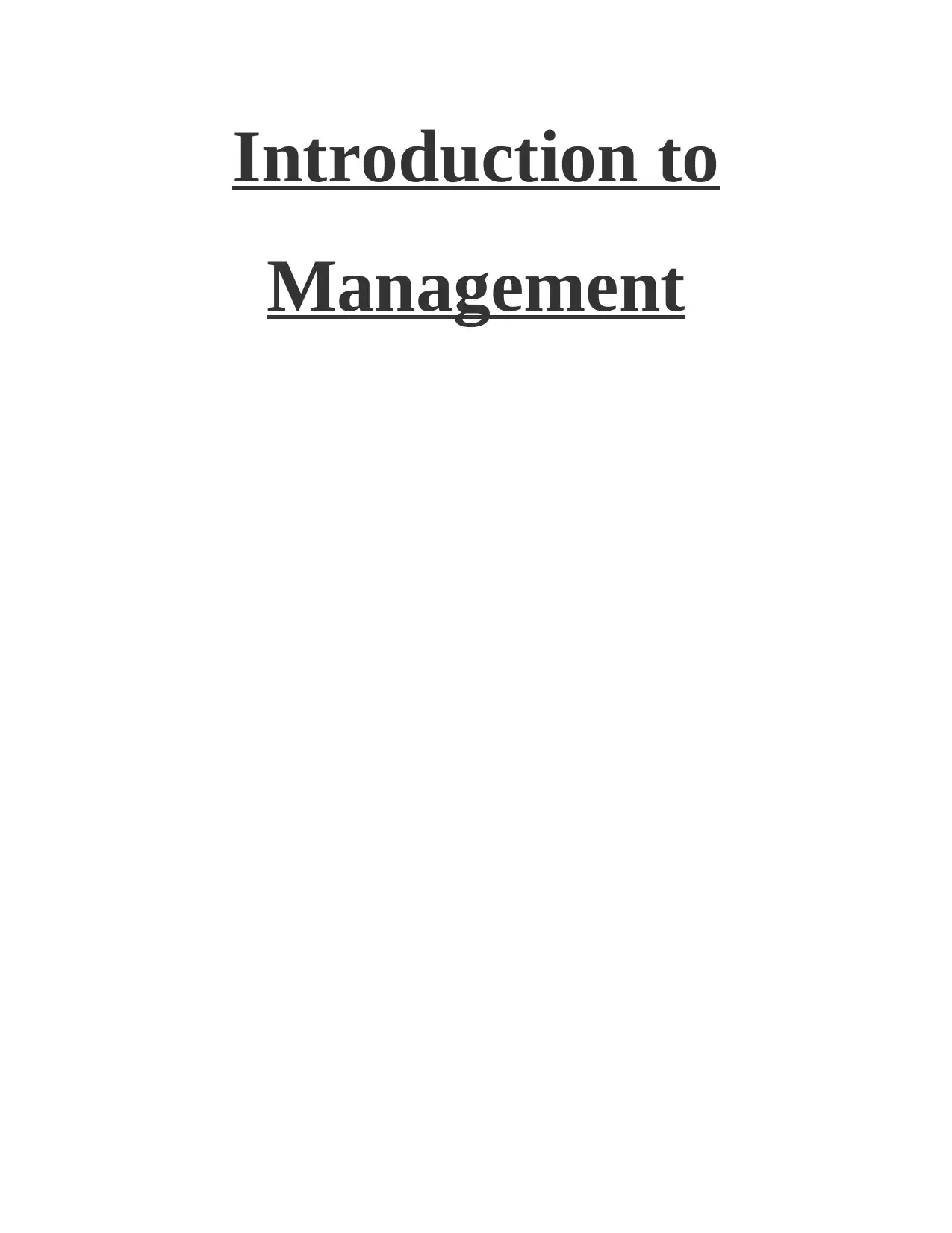
Introduction to
Management
Management
Paraphrase This Document
Need a fresh take? Get an instant paraphrase of this document with our AI Paraphraser
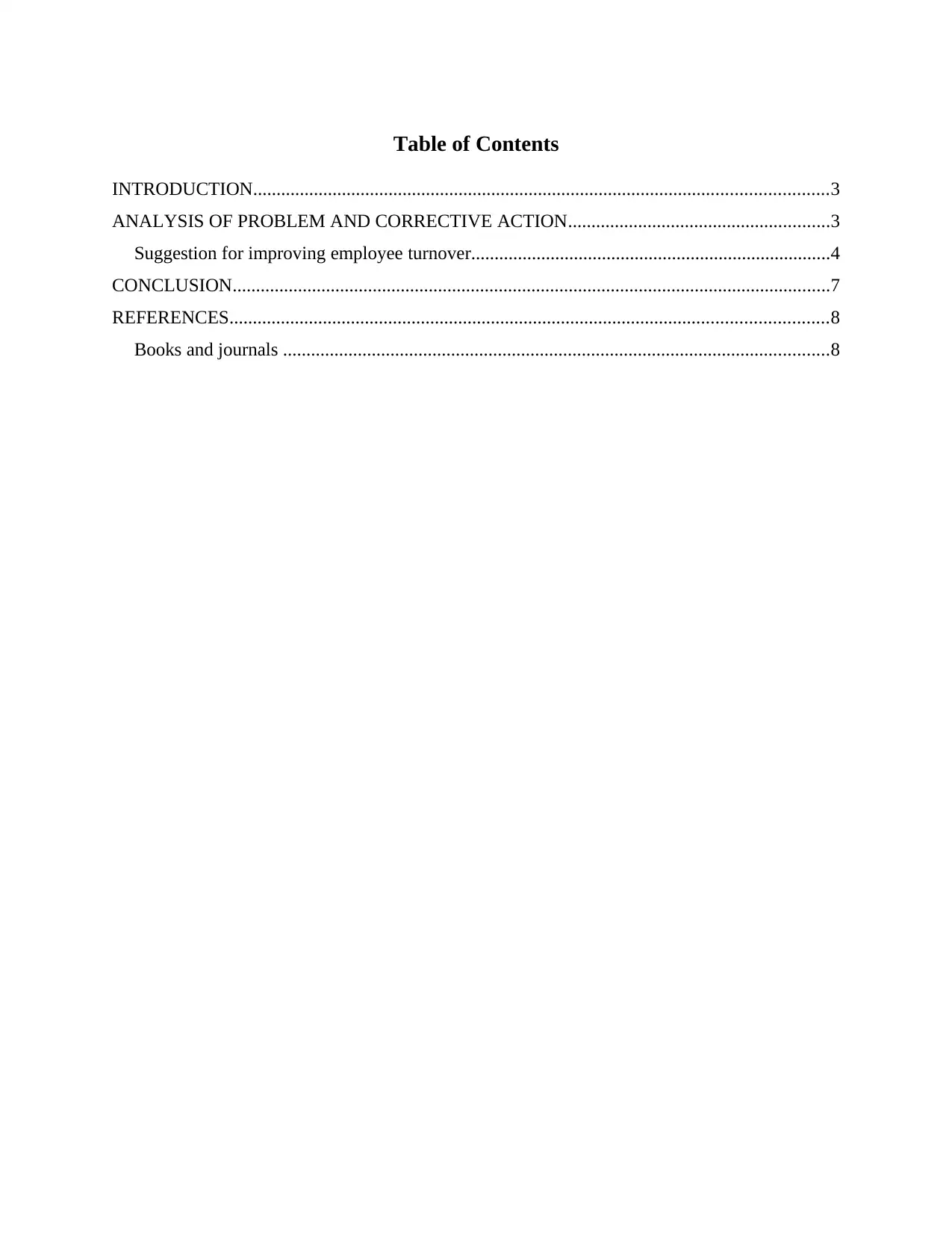
Table of Contents
INTRODUCTION...........................................................................................................................3
ANALYSIS OF PROBLEM AND CORRECTIVE ACTION........................................................3
Suggestion for improving employee turnover.............................................................................4
CONCLUSION................................................................................................................................7
REFERENCES................................................................................................................................8
Books and journals .....................................................................................................................8
INTRODUCTION...........................................................................................................................3
ANALYSIS OF PROBLEM AND CORRECTIVE ACTION........................................................3
Suggestion for improving employee turnover.............................................................................4
CONCLUSION................................................................................................................................7
REFERENCES................................................................................................................................8
Books and journals .....................................................................................................................8
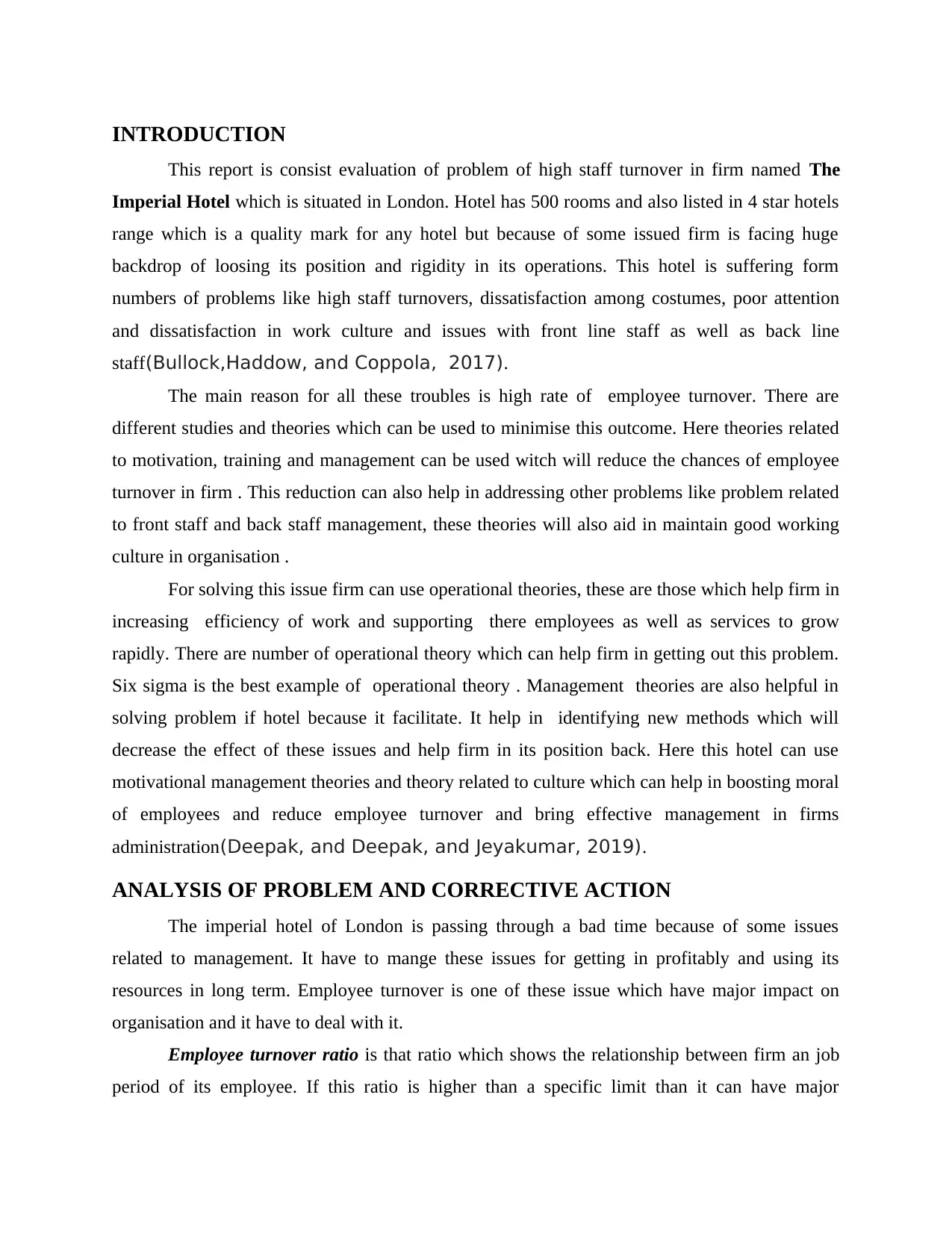
INTRODUCTION
This report is consist evaluation of problem of high staff turnover in firm named The
Imperial Hotel which is situated in London. Hotel has 500 rooms and also listed in 4 star hotels
range which is a quality mark for any hotel but because of some issued firm is facing huge
backdrop of loosing its position and rigidity in its operations. This hotel is suffering form
numbers of problems like high staff turnovers, dissatisfaction among costumes, poor attention
and dissatisfaction in work culture and issues with front line staff as well as back line
staff(Bullock,Haddow, and Coppola, 2017).
The main reason for all these troubles is high rate of employee turnover. There are
different studies and theories which can be used to minimise this outcome. Here theories related
to motivation, training and management can be used witch will reduce the chances of employee
turnover in firm . This reduction can also help in addressing other problems like problem related
to front staff and back staff management, these theories will also aid in maintain good working
culture in organisation .
For solving this issue firm can use operational theories, these are those which help firm in
increasing efficiency of work and supporting there employees as well as services to grow
rapidly. There are number of operational theory which can help firm in getting out this problem.
Six sigma is the best example of operational theory . Management theories are also helpful in
solving problem if hotel because it facilitate. It help in identifying new methods which will
decrease the effect of these issues and help firm in its position back. Here this hotel can use
motivational management theories and theory related to culture which can help in boosting moral
of employees and reduce employee turnover and bring effective management in firms
administration(Deepak, and Deepak, and Jeyakumar, 2019).
ANALYSIS OF PROBLEM AND CORRECTIVE ACTION
The imperial hotel of London is passing through a bad time because of some issues
related to management. It have to mange these issues for getting in profitably and using its
resources in long term. Employee turnover is one of these issue which have major impact on
organisation and it have to deal with it.
Employee turnover ratio is that ratio which shows the relationship between firm an job
period of its employee. If this ratio is higher than a specific limit than it can have major
This report is consist evaluation of problem of high staff turnover in firm named The
Imperial Hotel which is situated in London. Hotel has 500 rooms and also listed in 4 star hotels
range which is a quality mark for any hotel but because of some issued firm is facing huge
backdrop of loosing its position and rigidity in its operations. This hotel is suffering form
numbers of problems like high staff turnovers, dissatisfaction among costumes, poor attention
and dissatisfaction in work culture and issues with front line staff as well as back line
staff(Bullock,Haddow, and Coppola, 2017).
The main reason for all these troubles is high rate of employee turnover. There are
different studies and theories which can be used to minimise this outcome. Here theories related
to motivation, training and management can be used witch will reduce the chances of employee
turnover in firm . This reduction can also help in addressing other problems like problem related
to front staff and back staff management, these theories will also aid in maintain good working
culture in organisation .
For solving this issue firm can use operational theories, these are those which help firm in
increasing efficiency of work and supporting there employees as well as services to grow
rapidly. There are number of operational theory which can help firm in getting out this problem.
Six sigma is the best example of operational theory . Management theories are also helpful in
solving problem if hotel because it facilitate. It help in identifying new methods which will
decrease the effect of these issues and help firm in its position back. Here this hotel can use
motivational management theories and theory related to culture which can help in boosting moral
of employees and reduce employee turnover and bring effective management in firms
administration(Deepak, and Deepak, and Jeyakumar, 2019).
ANALYSIS OF PROBLEM AND CORRECTIVE ACTION
The imperial hotel of London is passing through a bad time because of some issues
related to management. It have to mange these issues for getting in profitably and using its
resources in long term. Employee turnover is one of these issue which have major impact on
organisation and it have to deal with it.
Employee turnover ratio is that ratio which shows the relationship between firm an job
period of its employee. If this ratio is higher than a specific limit than it can have major
⊘ This is a preview!⊘
Do you want full access?
Subscribe today to unlock all pages.

Trusted by 1+ million students worldwide
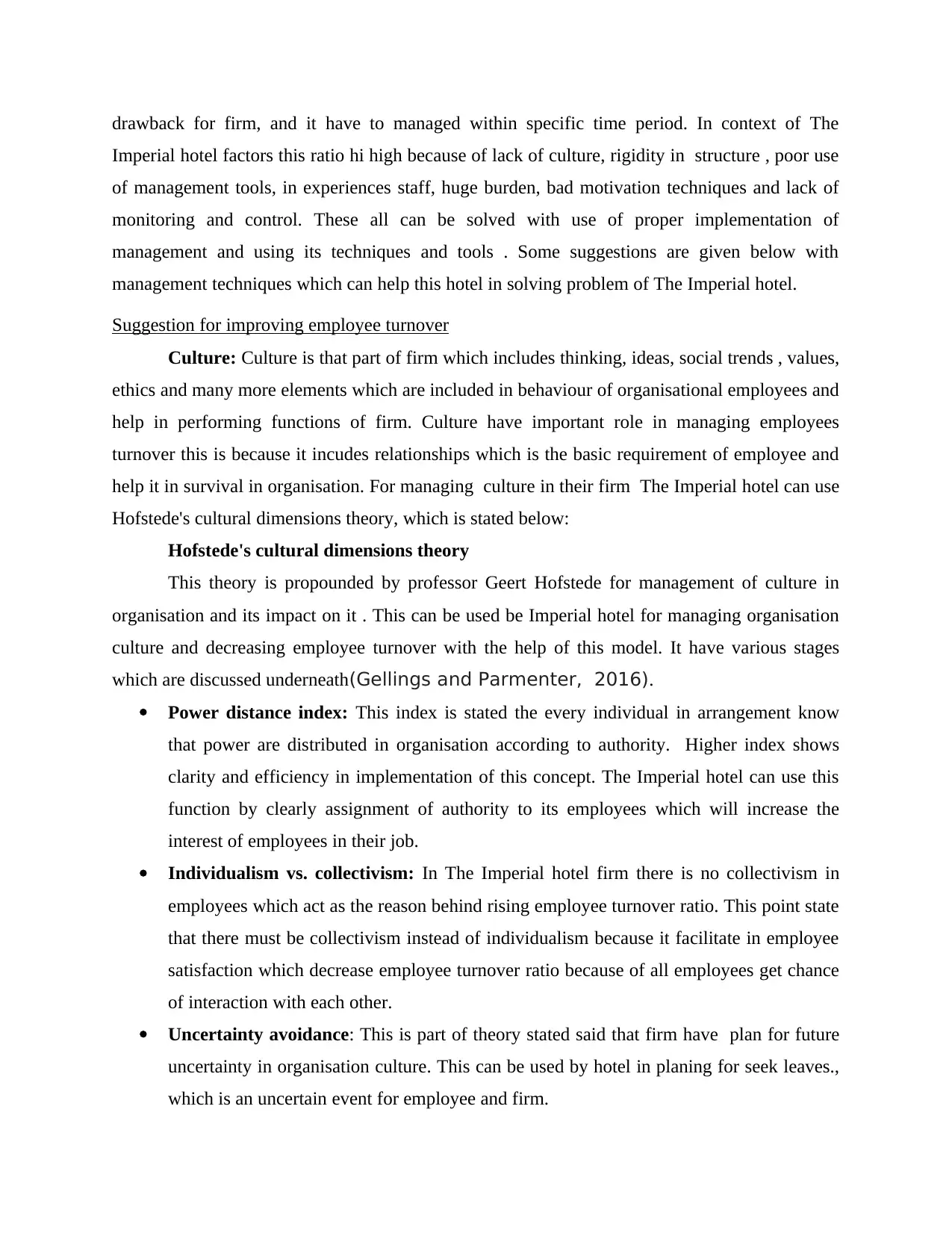
drawback for firm, and it have to managed within specific time period. In context of The
Imperial hotel factors this ratio hi high because of lack of culture, rigidity in structure , poor use
of management tools, in experiences staff, huge burden, bad motivation techniques and lack of
monitoring and control. These all can be solved with use of proper implementation of
management and using its techniques and tools . Some suggestions are given below with
management techniques which can help this hotel in solving problem of The Imperial hotel.
Suggestion for improving employee turnover
Culture: Culture is that part of firm which includes thinking, ideas, social trends , values,
ethics and many more elements which are included in behaviour of organisational employees and
help in performing functions of firm. Culture have important role in managing employees
turnover this is because it incudes relationships which is the basic requirement of employee and
help it in survival in organisation. For managing culture in their firm The Imperial hotel can use
Hofstede's cultural dimensions theory, which is stated below:
Hofstede's cultural dimensions theory
This theory is propounded by professor Geert Hofstede for management of culture in
organisation and its impact on it . This can be used be Imperial hotel for managing organisation
culture and decreasing employee turnover with the help of this model. It have various stages
which are discussed underneath(Gellings and Parmenter, 2016).
Power distance index: This index is stated the every individual in arrangement know
that power are distributed in organisation according to authority. Higher index shows
clarity and efficiency in implementation of this concept. The Imperial hotel can use this
function by clearly assignment of authority to its employees which will increase the
interest of employees in their job.
Individualism vs. collectivism: In The Imperial hotel firm there is no collectivism in
employees which act as the reason behind rising employee turnover ratio. This point state
that there must be collectivism instead of individualism because it facilitate in employee
satisfaction which decrease employee turnover ratio because of all employees get chance
of interaction with each other.
Uncertainty avoidance: This is part of theory stated said that firm have plan for future
uncertainty in organisation culture. This can be used by hotel in planing for seek leaves.,
which is an uncertain event for employee and firm.
Imperial hotel factors this ratio hi high because of lack of culture, rigidity in structure , poor use
of management tools, in experiences staff, huge burden, bad motivation techniques and lack of
monitoring and control. These all can be solved with use of proper implementation of
management and using its techniques and tools . Some suggestions are given below with
management techniques which can help this hotel in solving problem of The Imperial hotel.
Suggestion for improving employee turnover
Culture: Culture is that part of firm which includes thinking, ideas, social trends , values,
ethics and many more elements which are included in behaviour of organisational employees and
help in performing functions of firm. Culture have important role in managing employees
turnover this is because it incudes relationships which is the basic requirement of employee and
help it in survival in organisation. For managing culture in their firm The Imperial hotel can use
Hofstede's cultural dimensions theory, which is stated below:
Hofstede's cultural dimensions theory
This theory is propounded by professor Geert Hofstede for management of culture in
organisation and its impact on it . This can be used be Imperial hotel for managing organisation
culture and decreasing employee turnover with the help of this model. It have various stages
which are discussed underneath(Gellings and Parmenter, 2016).
Power distance index: This index is stated the every individual in arrangement know
that power are distributed in organisation according to authority. Higher index shows
clarity and efficiency in implementation of this concept. The Imperial hotel can use this
function by clearly assignment of authority to its employees which will increase the
interest of employees in their job.
Individualism vs. collectivism: In The Imperial hotel firm there is no collectivism in
employees which act as the reason behind rising employee turnover ratio. This point state
that there must be collectivism instead of individualism because it facilitate in employee
satisfaction which decrease employee turnover ratio because of all employees get chance
of interaction with each other.
Uncertainty avoidance: This is part of theory stated said that firm have plan for future
uncertainty in organisation culture. This can be used by hotel in planing for seek leaves.,
which is an uncertain event for employee and firm.
Paraphrase This Document
Need a fresh take? Get an instant paraphrase of this document with our AI Paraphraser
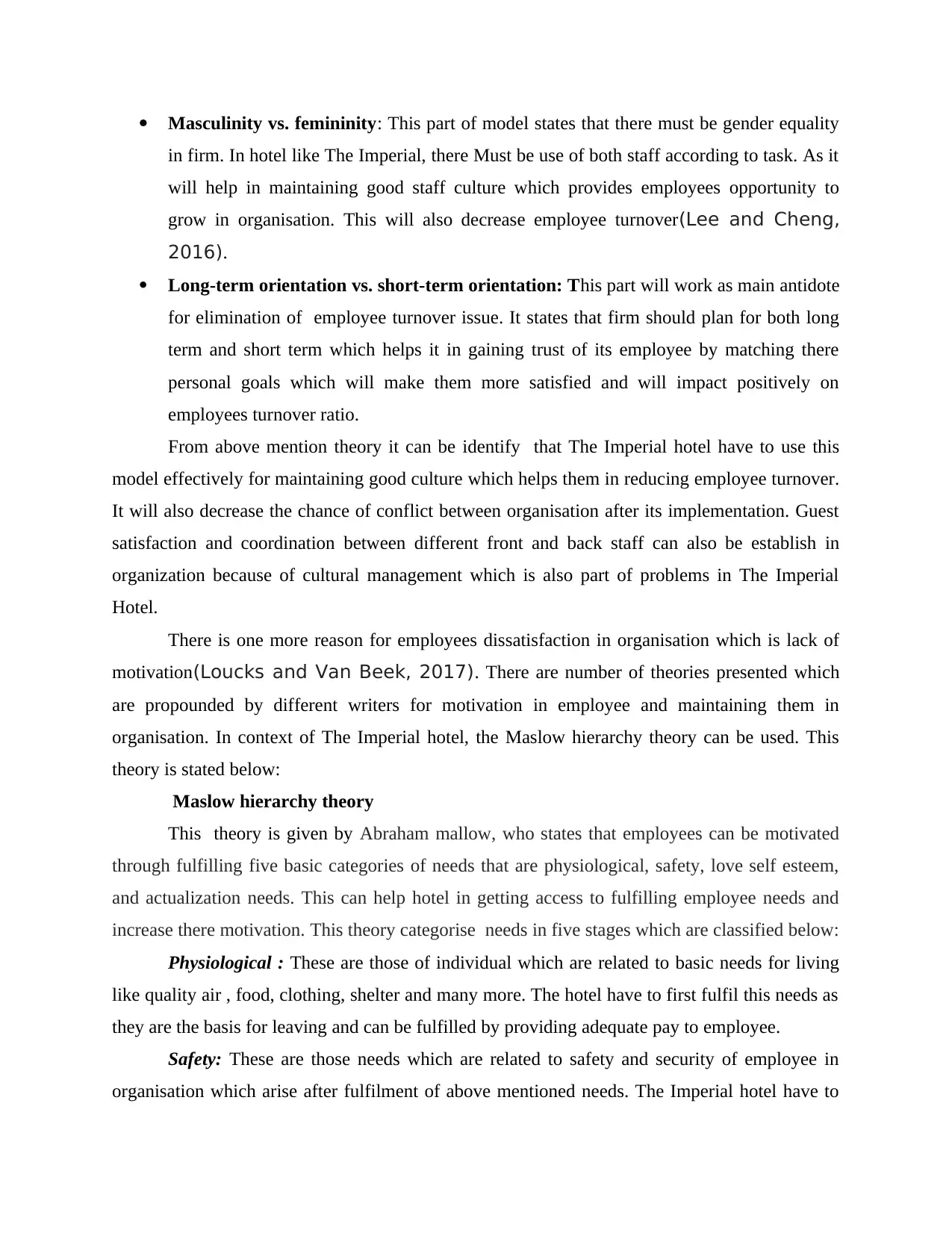
Masculinity vs. femininity: This part of model states that there must be gender equality
in firm. In hotel like The Imperial, there Must be use of both staff according to task. As it
will help in maintaining good staff culture which provides employees opportunity to
grow in organisation. This will also decrease employee turnover(Lee and Cheng,
2016).
Long-term orientation vs. short-term orientation: This part will work as main antidote
for elimination of employee turnover issue. It states that firm should plan for both long
term and short term which helps it in gaining trust of its employee by matching there
personal goals which will make them more satisfied and will impact positively on
employees turnover ratio.
From above mention theory it can be identify that The Imperial hotel have to use this
model effectively for maintaining good culture which helps them in reducing employee turnover.
It will also decrease the chance of conflict between organisation after its implementation. Guest
satisfaction and coordination between different front and back staff can also be establish in
organization because of cultural management which is also part of problems in The Imperial
Hotel.
There is one more reason for employees dissatisfaction in organisation which is lack of
motivation(Loucks and Van Beek, 2017). There are number of theories presented which
are propounded by different writers for motivation in employee and maintaining them in
organisation. In context of The Imperial hotel, the Maslow hierarchy theory can be used. This
theory is stated below:
Maslow hierarchy theory
This theory is given by Abraham mallow, who states that employees can be motivated
through fulfilling five basic categories of needs that are physiological, safety, love self esteem,
and actualization needs. This can help hotel in getting access to fulfilling employee needs and
increase there motivation. This theory categorise needs in five stages which are classified below:
Physiological : These are those of individual which are related to basic needs for living
like quality air , food, clothing, shelter and many more. The hotel have to first fulfil this needs as
they are the basis for leaving and can be fulfilled by providing adequate pay to employee.
Safety: These are those needs which are related to safety and security of employee in
organisation which arise after fulfilment of above mentioned needs. The Imperial hotel have to
in firm. In hotel like The Imperial, there Must be use of both staff according to task. As it
will help in maintaining good staff culture which provides employees opportunity to
grow in organisation. This will also decrease employee turnover(Lee and Cheng,
2016).
Long-term orientation vs. short-term orientation: This part will work as main antidote
for elimination of employee turnover issue. It states that firm should plan for both long
term and short term which helps it in gaining trust of its employee by matching there
personal goals which will make them more satisfied and will impact positively on
employees turnover ratio.
From above mention theory it can be identify that The Imperial hotel have to use this
model effectively for maintaining good culture which helps them in reducing employee turnover.
It will also decrease the chance of conflict between organisation after its implementation. Guest
satisfaction and coordination between different front and back staff can also be establish in
organization because of cultural management which is also part of problems in The Imperial
Hotel.
There is one more reason for employees dissatisfaction in organisation which is lack of
motivation(Loucks and Van Beek, 2017). There are number of theories presented which
are propounded by different writers for motivation in employee and maintaining them in
organisation. In context of The Imperial hotel, the Maslow hierarchy theory can be used. This
theory is stated below:
Maslow hierarchy theory
This theory is given by Abraham mallow, who states that employees can be motivated
through fulfilling five basic categories of needs that are physiological, safety, love self esteem,
and actualization needs. This can help hotel in getting access to fulfilling employee needs and
increase there motivation. This theory categorise needs in five stages which are classified below:
Physiological : These are those of individual which are related to basic needs for living
like quality air , food, clothing, shelter and many more. The hotel have to first fulfil this needs as
they are the basis for leaving and can be fulfilled by providing adequate pay to employee.
Safety: These are those needs which are related to safety and security of employee in
organisation which arise after fulfilment of above mentioned needs. The Imperial hotel have to
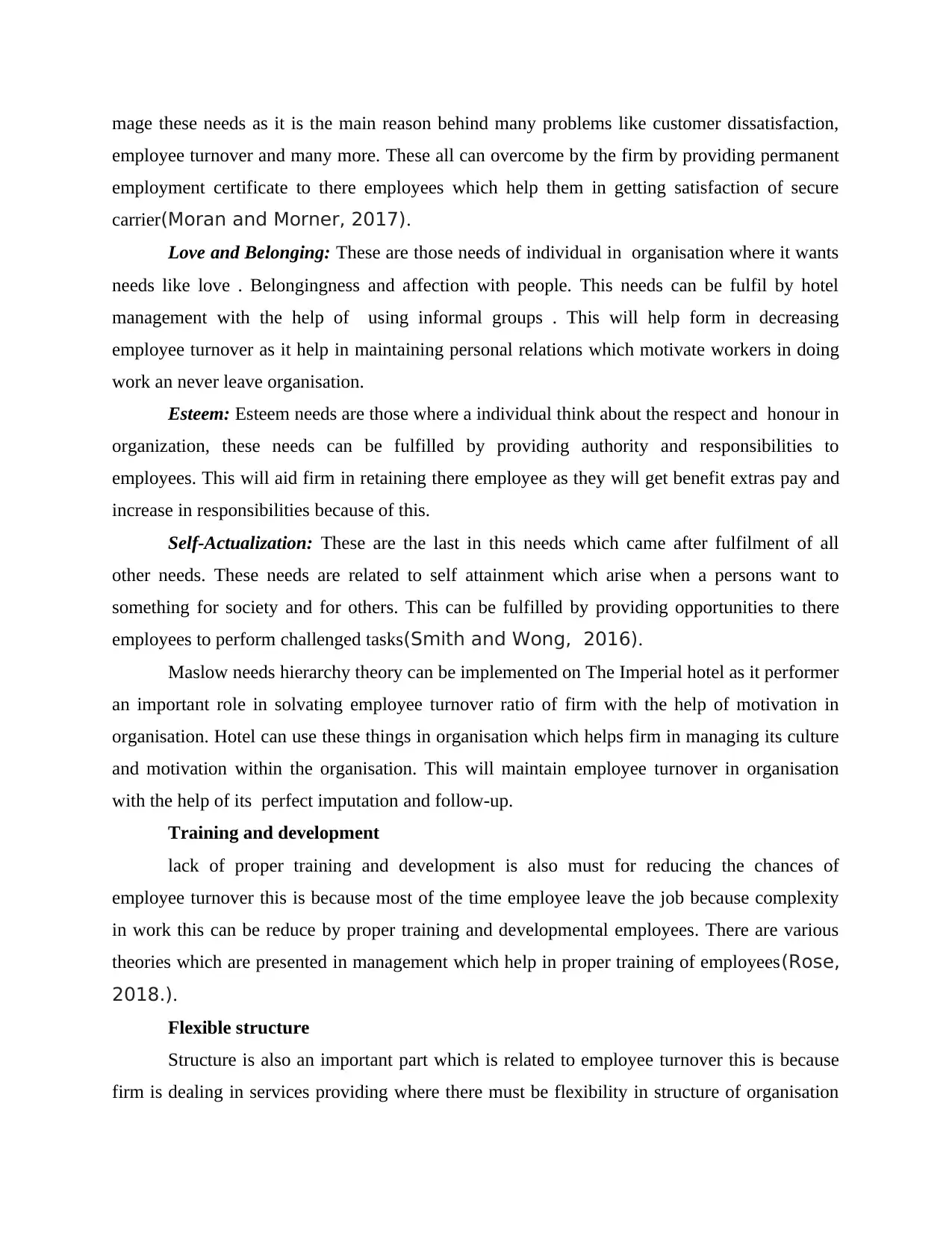
mage these needs as it is the main reason behind many problems like customer dissatisfaction,
employee turnover and many more. These all can overcome by the firm by providing permanent
employment certificate to there employees which help them in getting satisfaction of secure
carrier(Moran and Morner, 2017).
Love and Belonging: These are those needs of individual in organisation where it wants
needs like love . Belongingness and affection with people. This needs can be fulfil by hotel
management with the help of using informal groups . This will help form in decreasing
employee turnover as it help in maintaining personal relations which motivate workers in doing
work an never leave organisation.
Esteem: Esteem needs are those where a individual think about the respect and honour in
organization, these needs can be fulfilled by providing authority and responsibilities to
employees. This will aid firm in retaining there employee as they will get benefit extras pay and
increase in responsibilities because of this.
Self-Actualization: These are the last in this needs which came after fulfilment of all
other needs. These needs are related to self attainment which arise when a persons want to
something for society and for others. This can be fulfilled by providing opportunities to there
employees to perform challenged tasks(Smith and Wong, 2016).
Maslow needs hierarchy theory can be implemented on The Imperial hotel as it performer
an important role in solvating employee turnover ratio of firm with the help of motivation in
organisation. Hotel can use these things in organisation which helps firm in managing its culture
and motivation within the organisation. This will maintain employee turnover in organisation
with the help of its perfect imputation and follow-up.
Training and development
lack of proper training and development is also must for reducing the chances of
employee turnover this is because most of the time employee leave the job because complexity
in work this can be reduce by proper training and developmental employees. There are various
theories which are presented in management which help in proper training of employees(Rose,
2018.).
Flexible structure
Structure is also an important part which is related to employee turnover this is because
firm is dealing in services providing where there must be flexibility in structure of organisation
employee turnover and many more. These all can overcome by the firm by providing permanent
employment certificate to there employees which help them in getting satisfaction of secure
carrier(Moran and Morner, 2017).
Love and Belonging: These are those needs of individual in organisation where it wants
needs like love . Belongingness and affection with people. This needs can be fulfil by hotel
management with the help of using informal groups . This will help form in decreasing
employee turnover as it help in maintaining personal relations which motivate workers in doing
work an never leave organisation.
Esteem: Esteem needs are those where a individual think about the respect and honour in
organization, these needs can be fulfilled by providing authority and responsibilities to
employees. This will aid firm in retaining there employee as they will get benefit extras pay and
increase in responsibilities because of this.
Self-Actualization: These are the last in this needs which came after fulfilment of all
other needs. These needs are related to self attainment which arise when a persons want to
something for society and for others. This can be fulfilled by providing opportunities to there
employees to perform challenged tasks(Smith and Wong, 2016).
Maslow needs hierarchy theory can be implemented on The Imperial hotel as it performer
an important role in solvating employee turnover ratio of firm with the help of motivation in
organisation. Hotel can use these things in organisation which helps firm in managing its culture
and motivation within the organisation. This will maintain employee turnover in organisation
with the help of its perfect imputation and follow-up.
Training and development
lack of proper training and development is also must for reducing the chances of
employee turnover this is because most of the time employee leave the job because complexity
in work this can be reduce by proper training and developmental employees. There are various
theories which are presented in management which help in proper training of employees(Rose,
2018.).
Flexible structure
Structure is also an important part which is related to employee turnover this is because
firm is dealing in services providing where there must be flexibility in structure of organisation
⊘ This is a preview!⊘
Do you want full access?
Subscribe today to unlock all pages.

Trusted by 1+ million students worldwide
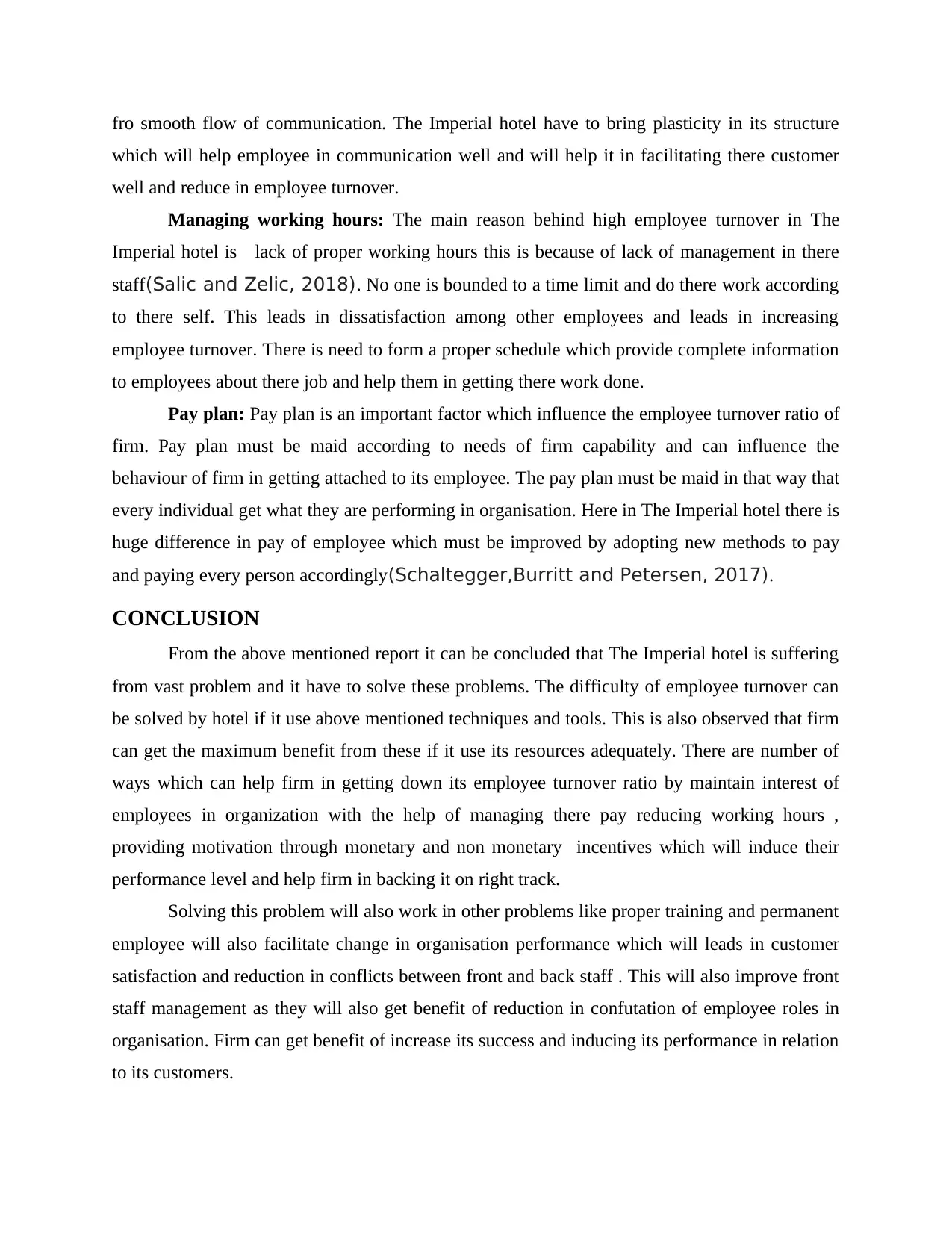
fro smooth flow of communication. The Imperial hotel have to bring plasticity in its structure
which will help employee in communication well and will help it in facilitating there customer
well and reduce in employee turnover.
Managing working hours: The main reason behind high employee turnover in The
Imperial hotel is lack of proper working hours this is because of lack of management in there
staff(Salic and Zelic, 2018). No one is bounded to a time limit and do there work according
to there self. This leads in dissatisfaction among other employees and leads in increasing
employee turnover. There is need to form a proper schedule which provide complete information
to employees about there job and help them in getting there work done.
Pay plan: Pay plan is an important factor which influence the employee turnover ratio of
firm. Pay plan must be maid according to needs of firm capability and can influence the
behaviour of firm in getting attached to its employee. The pay plan must be maid in that way that
every individual get what they are performing in organisation. Here in The Imperial hotel there is
huge difference in pay of employee which must be improved by adopting new methods to pay
and paying every person accordingly(Schaltegger,Burritt and Petersen, 2017).
CONCLUSION
From the above mentioned report it can be concluded that The Imperial hotel is suffering
from vast problem and it have to solve these problems. The difficulty of employee turnover can
be solved by hotel if it use above mentioned techniques and tools. This is also observed that firm
can get the maximum benefit from these if it use its resources adequately. There are number of
ways which can help firm in getting down its employee turnover ratio by maintain interest of
employees in organization with the help of managing there pay reducing working hours ,
providing motivation through monetary and non monetary incentives which will induce their
performance level and help firm in backing it on right track.
Solving this problem will also work in other problems like proper training and permanent
employee will also facilitate change in organisation performance which will leads in customer
satisfaction and reduction in conflicts between front and back staff . This will also improve front
staff management as they will also get benefit of reduction in confutation of employee roles in
organisation. Firm can get benefit of increase its success and inducing its performance in relation
to its customers.
which will help employee in communication well and will help it in facilitating there customer
well and reduce in employee turnover.
Managing working hours: The main reason behind high employee turnover in The
Imperial hotel is lack of proper working hours this is because of lack of management in there
staff(Salic and Zelic, 2018). No one is bounded to a time limit and do there work according
to there self. This leads in dissatisfaction among other employees and leads in increasing
employee turnover. There is need to form a proper schedule which provide complete information
to employees about there job and help them in getting there work done.
Pay plan: Pay plan is an important factor which influence the employee turnover ratio of
firm. Pay plan must be maid according to needs of firm capability and can influence the
behaviour of firm in getting attached to its employee. The pay plan must be maid in that way that
every individual get what they are performing in organisation. Here in The Imperial hotel there is
huge difference in pay of employee which must be improved by adopting new methods to pay
and paying every person accordingly(Schaltegger,Burritt and Petersen, 2017).
CONCLUSION
From the above mentioned report it can be concluded that The Imperial hotel is suffering
from vast problem and it have to solve these problems. The difficulty of employee turnover can
be solved by hotel if it use above mentioned techniques and tools. This is also observed that firm
can get the maximum benefit from these if it use its resources adequately. There are number of
ways which can help firm in getting down its employee turnover ratio by maintain interest of
employees in organization with the help of managing there pay reducing working hours ,
providing motivation through monetary and non monetary incentives which will induce their
performance level and help firm in backing it on right track.
Solving this problem will also work in other problems like proper training and permanent
employee will also facilitate change in organisation performance which will leads in customer
satisfaction and reduction in conflicts between front and back staff . This will also improve front
staff management as they will also get benefit of reduction in confutation of employee roles in
organisation. Firm can get benefit of increase its success and inducing its performance in relation
to its customers.
Paraphrase This Document
Need a fresh take? Get an instant paraphrase of this document with our AI Paraphraser
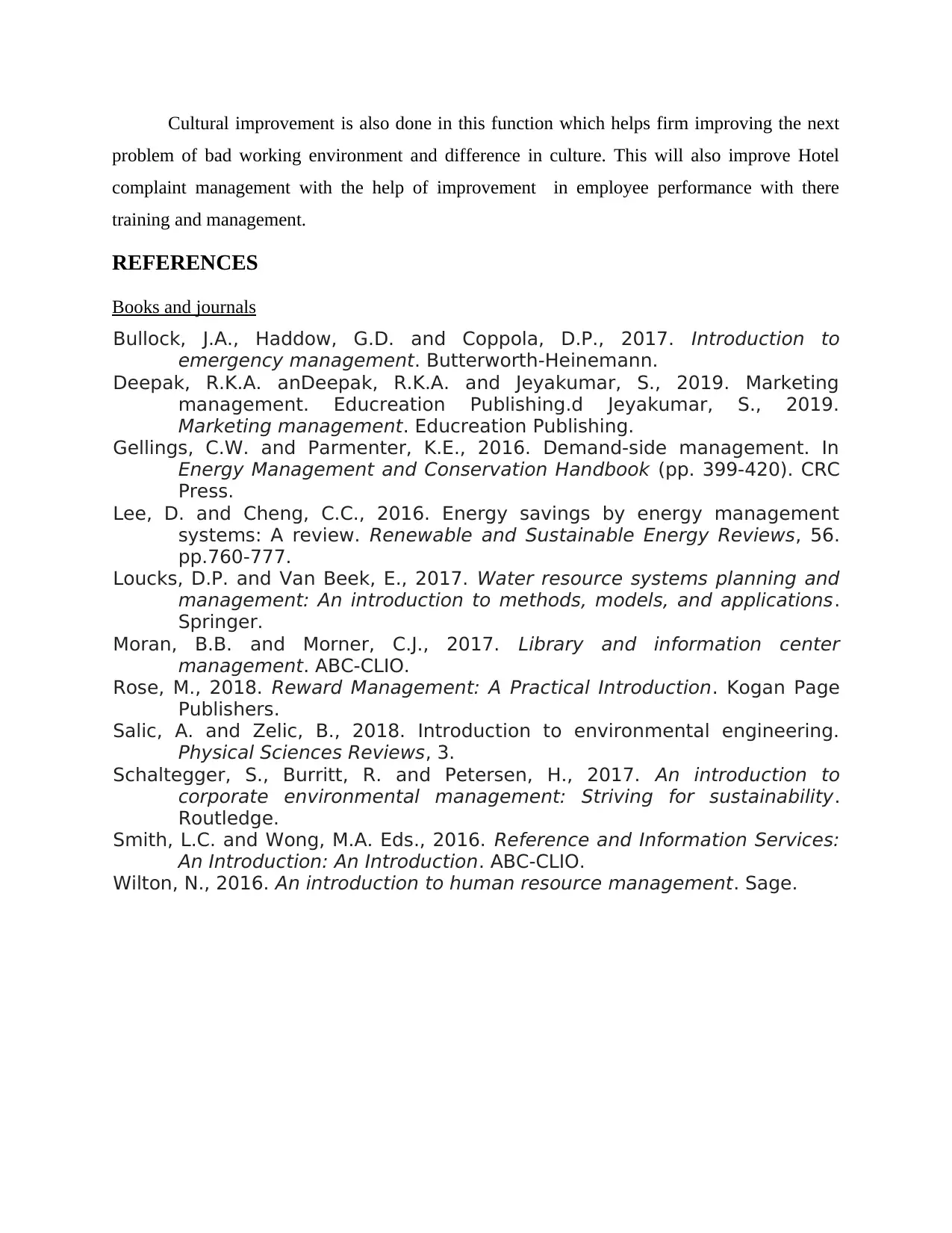
Cultural improvement is also done in this function which helps firm improving the next
problem of bad working environment and difference in culture. This will also improve Hotel
complaint management with the help of improvement in employee performance with there
training and management.
REFERENCES
Books and journals
Bullock, J.A., Haddow, G.D. and Coppola, D.P., 2017. Introduction to
emergency management. Butterworth-Heinemann.
Deepak, R.K.A. anDeepak, R.K.A. and Jeyakumar, S., 2019. Marketing
management. Educreation Publishing.d Jeyakumar, S., 2019.
Marketing management. Educreation Publishing.
Gellings, C.W. and Parmenter, K.E., 2016. Demand-side management. In
Energy Management and Conservation Handbook (pp. 399-420). CRC
Press.
Lee, D. and Cheng, C.C., 2016. Energy savings by energy management
systems: A review. Renewable and Sustainable Energy Reviews, 56.
pp.760-777.
Loucks, D.P. and Van Beek, E., 2017. Water resource systems planning and
management: An introduction to methods, models, and applications.
Springer.
Moran, B.B. and Morner, C.J., 2017. Library and information center
management. ABC-CLIO.
Rose, M., 2018. Reward Management: A Practical Introduction. Kogan Page
Publishers.
Salic, A. and Zelic, B., 2018. Introduction to environmental engineering.
Physical Sciences Reviews, 3.
Schaltegger, S., Burritt, R. and Petersen, H., 2017. An introduction to
corporate environmental management: Striving for sustainability.
Routledge.
Smith, L.C. and Wong, M.A. Eds., 2016. Reference and Information Services:
An Introduction: An Introduction. ABC-CLIO.
Wilton, N., 2016. An introduction to human resource management. Sage.
problem of bad working environment and difference in culture. This will also improve Hotel
complaint management with the help of improvement in employee performance with there
training and management.
REFERENCES
Books and journals
Bullock, J.A., Haddow, G.D. and Coppola, D.P., 2017. Introduction to
emergency management. Butterworth-Heinemann.
Deepak, R.K.A. anDeepak, R.K.A. and Jeyakumar, S., 2019. Marketing
management. Educreation Publishing.d Jeyakumar, S., 2019.
Marketing management. Educreation Publishing.
Gellings, C.W. and Parmenter, K.E., 2016. Demand-side management. In
Energy Management and Conservation Handbook (pp. 399-420). CRC
Press.
Lee, D. and Cheng, C.C., 2016. Energy savings by energy management
systems: A review. Renewable and Sustainable Energy Reviews, 56.
pp.760-777.
Loucks, D.P. and Van Beek, E., 2017. Water resource systems planning and
management: An introduction to methods, models, and applications.
Springer.
Moran, B.B. and Morner, C.J., 2017. Library and information center
management. ABC-CLIO.
Rose, M., 2018. Reward Management: A Practical Introduction. Kogan Page
Publishers.
Salic, A. and Zelic, B., 2018. Introduction to environmental engineering.
Physical Sciences Reviews, 3.
Schaltegger, S., Burritt, R. and Petersen, H., 2017. An introduction to
corporate environmental management: Striving for sustainability.
Routledge.
Smith, L.C. and Wong, M.A. Eds., 2016. Reference and Information Services:
An Introduction: An Introduction. ABC-CLIO.
Wilton, N., 2016. An introduction to human resource management. Sage.
1 out of 8
Related Documents
Your All-in-One AI-Powered Toolkit for Academic Success.
+13062052269
info@desklib.com
Available 24*7 on WhatsApp / Email
![[object Object]](/_next/static/media/star-bottom.7253800d.svg)
Unlock your academic potential
Copyright © 2020–2026 A2Z Services. All Rights Reserved. Developed and managed by ZUCOL.





